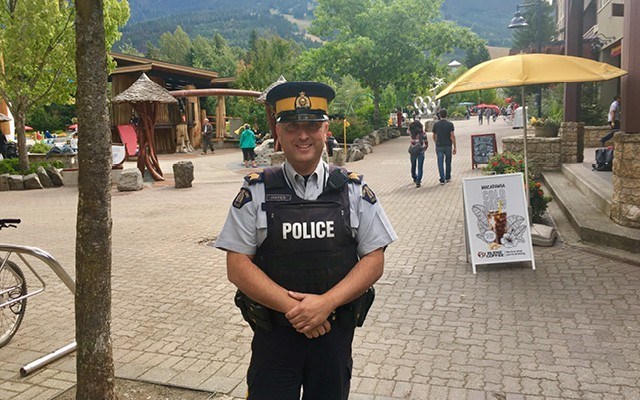The head of the Whistler and Pemberton RCMP is leaving his post this month after three years in the Sea to Sky.
First assuming the role as the RCMP’s North Zone commander in the summer of 2017, Staff Sgt. Paul Hayes will cut his posting a year short to take on a new position as a provincial inspector for the RCMP’s Divisional Duty Officer Program.
Hayes returns to the Lower Mainland after previously serving in Richmond, White Rock, and Surrey, where he worked in the detachment’s Diversity Outreach Program. It was in that role, which involved introducing new refugees to the RCMP’s policing style, that cemented Hayes’ penchant for relationship-building, a major priority during his time in the corridor.
“The work we did back then to try to make them feel comfortable around police, and teaching them how policing works here versus the various countries they had come from, really opened my eyes to the benefit of being able to get that community-positive relationship going,” he said.
“Why not have that same kind of community connection with permanent residents here?”
Hayes has helped forge that connection through an increased police visibility at local events and in the schools, as well as creating a special community liaison position.
The RCMP also made headway during Hayes tenure on curbing domestic assault and sexualized violence thanks to the creation of another specialized position specifically dedicated to those kinds of investigations.
“I think by having our officer in place now … the ability of that person to investigate the files, to provide up-to-date guidance to other members on investigative techniques and avenues has been phenomenal in the community,” Hayes said.
In 2019, reports of domestic violence dropped 28 per cent, while assaults—which made up more than half of all violent crime in Whistler last year—were down 20 per cent. Sexual assault bucked that trend, however, with an increase from 18 to 39 incidents last year, but that was partially linked to a shift in how the RCMP categorizes sexual assault, as well as the ability for survivors to report assaults anonymously through a third party, which was first introduced in the Sea to Sky in 2018.
As it has been for years locally, impaired driving was another key enforcement priority for Hayes. Although Whistler continues to see a concerning number of impaired driving offences (the resort ranked 17th in impaired driving nationwide in a 2019 Maclean’s study once the daily population equivalent was factored in), Hayes said the relative lack of serious and fatal accidents hints that enforcement is having its intended effect.
“It’s just an interesting statistic to look at, and I’d like to think that maybe our enforcement to remove those folks is paying dividends in terms of people’s lives and health,” he noted.
Impaired driving rose from 326 offences in 2018 to 385 last year, but there were no fatal crashes on Whistler’s roads in either year, while collisions causing non-fatal injuries mostly stayed flat, with 18 incidents last year compared to 16 in 2018.
Bike theft is another persistent issue for Whistler police that, on the surface, might appear like it’s getting worse, but a deeper dive into the numbers bears out a different trend. Between 2018 and 2019, reports of bike theft rose from 31 to 48 incidents, but the overall value of bikes stolen has plummeted as police have targeted so-called “shopping criminals” that travel to the resort looking for high-end models.
“We had seen hundreds of thousands of dollars in reductions of bike thefts in the last full year that we looked at as a result of a lot of education, enforcement, a lot of bait bikes, a lot of signage and communication, and then a lot of investigative work,” Hayes said, crediting the RCMP’s partnership with bike-recovery app and registration service 529 Garage for helping return stolen bikes to owners.
Cracking down on bike theft, at least pre-pandemic, has also proved a useful gateway to other forms of property crime, Hayes noted.
“I can recall a bike theft here that we ended up tracking back to the Lower Mainland and finding a house full of bikes and stolen property,” he relayed. “So we’re not just looking for the bike. It leads to other things that we’re following on the investigative path.”
Hayes said Sgt. Sascha Banks will fill in as interim zone commander until his replacement is named. The RCMP is also yet to announce who will take over as Officer in Charge for the Sea to Sky after Insp. Kara Triance departed this fall to serve as Central Okanagan’s new commander.


